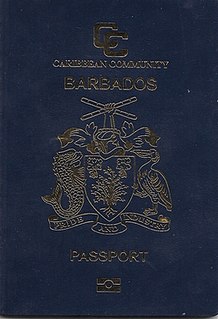
Border control refers to measures taken by governments to monitor and regulate the movement of people, animals, and goods across land, air, and maritime borders. While border control is typically associated with international borders, it also encompasses controls imposed on internal borders within a single state.

A visa is a conditional authorization granted by a polity to a foreigner that allows them to enter, remain within, or to leave its territory. Visas typically include limits on the duration of the foreigner's stay, areas within the country they may enter, the dates they may enter, the number of permitted visits, or if the individual has the ability to work in the country in question. Visas are associated with the request for permission to enter a territory and thus are, in most countries, distinct from actual formal permission for an alien to enter and remain in the country. In each instance, a visa is subject to entry permission by an immigration official at the time of actual entry and can be revoked at any time. Visa evidence most commonly takes the form of a sticker endorsed in the applicant's passport or other travel document but may also exist electronically. Some countries no longer issue physical visa evidence, instead recording details only in immigration databases.
The Visa Waiver Program (VWP) is a program of the United States federal government that allows nationals of specific countries to travel to the U.S. for tourism, business, or while in transit for up to 90 days without having to obtain a visa. It applies to all fifty U.S. states, the District of Columbia, Puerto Rico, and the U.S. Virgin Islands, as well as to Guam and the Northern Mariana Islands, which also have an additional program with waivers for more nationalities; American Samoa has a similar but separate program.

The Organisation of Eastern Caribbean States is an inter-governmental organisation dedicated to economic harmonisation and integration, protection of human and legal rights, and the encouragement of good governance between countries and territories in the Eastern Caribbean. It also performs the role of spreading responsibility and liability in the event of natural disaster.

Permanent residency is a person's legal resident status in a country or territory of which such person is not a citizen but where they have the right to reside on a permanent basis. This is usually for a permanent period; a person with such legal status is known as a permanent resident. In the United States, such a person is referred to as a green card holder but more formally as a Lawful Permanent Resident (LPR).

The Caribbean Court of Justice is the judicial institution of the Caribbean Community (CARICOM). Established in 2005, it is based in Port of Spain, Trinidad and Tobago.

The CARICOM Single Market and Economy, also known as the Caribbean Single Market and Economy (CSME), is an integrated development strategy envisioned at the 10th Meeting of the Conference of Heads of Government of the Caribbean Community (CARICOM) which took place in July 1989 in Grand Anse, Grenada. The Grand Anse Declaration had three key Features:
- Deepening economic integration by advancing beyond a common market towards a Single Market and Economy.
- Widening the membership and thereby expanding the economic mass of the Caribbean Community.
- Progressive insertion of the region into the global trading and economic system by strengthening trading links with non-traditional partners.
The Regional Security System (RSS) is an international agreement for the defence and security of the eastern Caribbean region with future expansion planned with South America.
The payment card industry (PCI) denotes the debit, credit, prepaid, e-purse, ATM, and POS cards and associated businesses.

A Barbados passport is a travel document issued to citizens of Barbados, in accordance with Citizenship Act from 1978, the Immigration Act from 1997, and the Barbados Constitution, for the purpose of facilitating international travel. It allows the bearer to travel to foreign countries in accordance with visa requirements, and facilitates the process of securing assistance from Barbados consular officials abroad, if necessary.

The CARICOM passport is a passport document issued by the 15 member states of the Caribbean Community (CARICOM) for their citizens. It can be used both for intra-regional and international travel. The passport was created to facilitate intra-region travel; however, citizens of the OECS that are citizens from Antigua and Barbuda, Dominica, Grenada, St. Kitts and Nevis, Saint Lucia, Guyana and St. Vincent and the Grenadines may use a member-state issued drivers licence, national identification card, voters registration card or social security card for travel within the OECS area.

The Commonwealth of Dominica passport is issued to citizens of the Commonwealth of Dominica for international travel. The passport is a Caricom passport as Dominica is a member of the Caribbean Community. The Commonwealth of Dominica's government issued new biometric e-passports to its citizens on July 19, 2021, upgrading the passport system by spending $13 million to improve national security across borders.

Maldivian passport is a proof of citizenship, issued by Maldives Immigration, to all the nationals of the Maldives for international travel. The current passport, the 2nd generation e-passport, was launched on 24 January 2016. This passport consists of a highly secured poly-carbonate data page with laser engraved photo and data. Each visa page of the passport has a different design, represented with numerous illustrations by the Maldivian local artist, Hussain Ali Manik. A Maldivian Passport can be issued to any Maldivian citizen who applies for a passport.

The visa policy of the United Kingdom is the policy by which His Majesty's Government determines visa requirements for visitors to the United Kingdom, and the Crown dependencies of Guernsey, Jersey, and the Isle of Man and those seeking to work, study or reside there. All intended entrants must obtain a visa unless they are exempt.
The nation of Trinidad and Tobago has been the leading supporter of the Caribbean Community (CARICOM). Trinidad and Tobago was one of the four members in 1973 which then along with Barbados, Guyana and Antigua and Barbuda moved to establish the organisation that today it known as the Caribbean Community and Common Market. The new organisation because a successor to the Caribbean Free Trade Association (CARIFTA) by the Treaty of Chaguaramas, of which Trinidad and Tobago was a leading member and also a founding member.

A member state of the Caribbean Community is a state that has been specified as a member state within the Treaty of Chaguaramas or any other Caribbean state that is in the opinion of the Conference, able and willing to exercise the rights and assume the obligations of membership in accordance with article 29 of the Treaty of Chaguaramas. Member states are designated as either More economically developed country (MDCs) or Less economically developed countries (LDCs). These designations are not intended to create disparity among member states. The Community was established by mainly English-speaking Caribbean countries, but has since become a multilingual organisation in practice with the addition of Dutch-speaking Suriname in 1995 and French-speaking Haiti in 2002. There are fifteen full members of the Caribbean Community, four of which are founding members.

Visitors to Antigua and Barbuda must obtain a visa from one of the Antigua and Barbuda diplomatic missions or in certain cases in United Kingdom diplomatic missions unless they come from one of the visa exempt countries.
Visa requirements for Antigua and Barbuda citizens are administrative entry restrictions by the authorities of other states placed on citizens of Antigua and Barbuda. As of 2 July 2019, Antigua and Barbuda citizens had visa-free or visa on arrival access to 151 countries and territories, ranking the Antigua and Barbuda passport 29th in terms of travel freedom according to the Henley Passport Index.

The European Union Agency for the Operational Management of Large-Scale IT Systems in the Area of Freedom, Security and Justice (eu-LISA) is an agency of the European Union (EU) that was founded in 2011 to ensure the uninterrupted operation of large-scale IT systems within the area of freedom, security and justice (AFSJ), that are instrumental in the implementation of the asylum, border management and migration policies of the EU. It began its operational activities on 1 December 2012. The current establishing regulation entered into force on 11 December 2018, repealing the previous regulation and expanding the Agency's mandate. The new mandate strengthens the Agency's capacity to improve, design and develop information systems for European security, border management and migration, and broadens the scope of the Agency's work on research, innovation, testing and on the possibility to support the development of pilot projects and proofs of concept.













